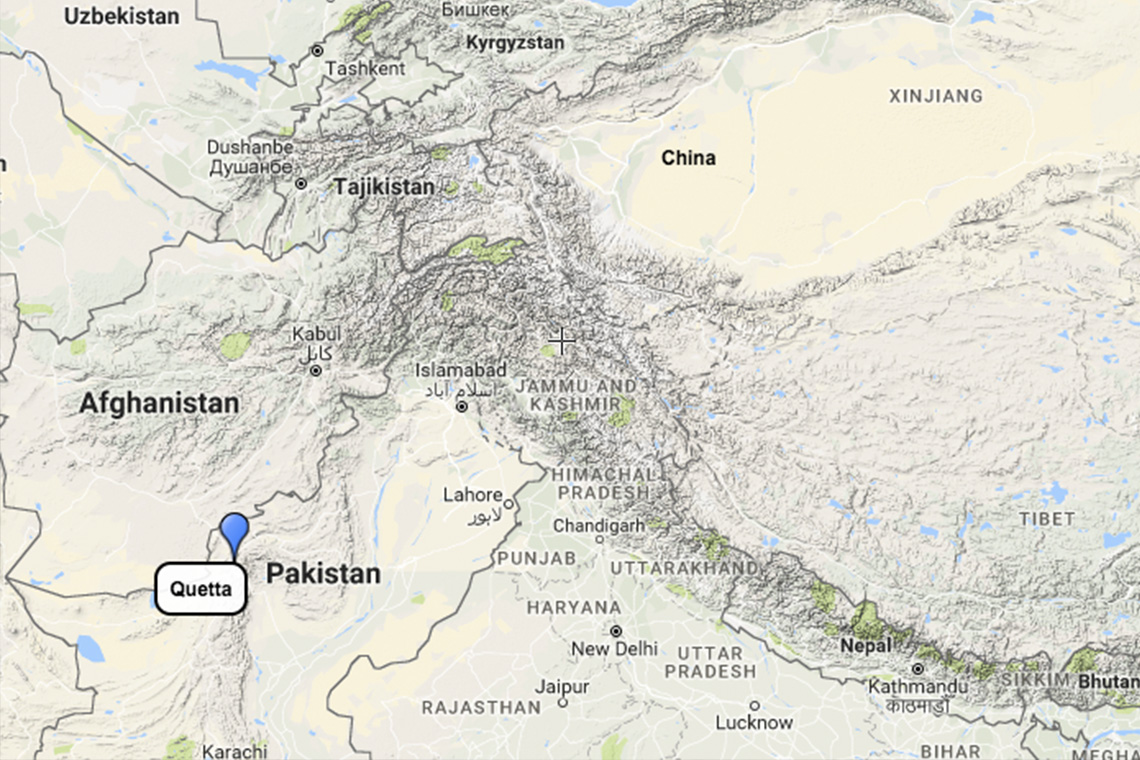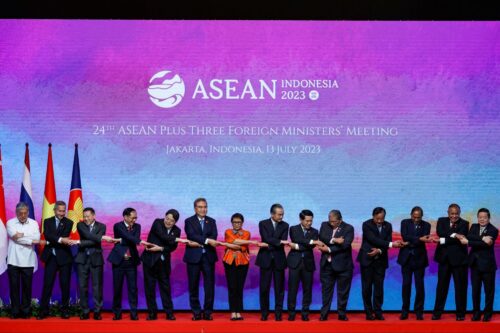Islamic State claims to have killed two Chinese teachers – China’s latest top news
A roundup of the top China news for June 9, 2017. Get this free daily digest delivered to your inbox by signing up at supchina.com/subscribe.

The fate of the kidnapped Chinese teachers in Pakistan
The Chinese foreign ministry has said the Pakistan government believes that two Chinese teachers kidnapped by Islamic State militants in Pakistan are “likely dead.” Reuters calls the kidnapping “a rare security incident involving Chinese nationals in Pakistan, where Beijing has pledged $57 billion under its massive ‘Belt and Road’ initiative to build rail, road and power infrastructure.”
- CNN says the man and woman were a couple, and were “kidnapped by armed men on May 24 from the city of Quetta, the capital of Pakistan’s Balochistan Province, on their way to teach a Chinese language class.”
- Amaq, a news agency affiliated with the Islamic State, released a video on June 8 showing two bodies shot and bleeding on the ground and said that the two teachers were dead.
- The South China Morning Post asks if the killings are “a sign of things to come for China in Pakistan,” as Belt and Road projects put more of its citizens in dangerous places.
- In March, the Islamic State released a video showing militants said to be Uyghurs from China vowing to return home to “shed blood like rivers.”
- You can listen to a Sinica Podcast interview from 2015 on the Islamic State and China with Edward Wong and Prashant Rao, two journalists with years of experience in Iraq and China.
- In 2015, the Islamic State captured a Norwegian and Chinese hostage near or in Syria, and gruesomely “offered them for sale” before murdering them.
Philanthropy and China’s super rich
The BBC says a new study reveals that “the top 100 philanthropists in mainland China…more than tripled” their donations between 2010 and 2016 to $4.6 billion,” and that of the 200 wealthiest people in China, 46 have foundations, with many more planning to establish charitable organizations. In addition, “technology giants Tencent, Alibaba and Sina all have desktop and mobile platforms designed to encourage mass giving by the general public.”
- The 2017 Hurun list of rich Chinese people says that logistics Tycoon Xu Guanju 徐冠巨became China’s most generous philanthropist, donating US$430 million in 2016 to a foundation that “focuses on relieving poverty, health, education and technology, green and ecology, agriculture and rural development.”
- A recent study for the Stanford Social Innovation Review by Christopher Marquis, Li Qi, and Qiao Kunyuan found that “while individual giving by Chinese entrepreneurs still lags behind that of their Western counterparts,” there is growing interest “in a collective form of philanthropy that does not easily fit into Western models.” This includes organizations such as the China Entrepreneurs Club, whose wealthy members combine networking with shared commitments to ethical business practices, and funding of public welfare initiatives.
- In March, the Financial Times noted (paywall) that schools and education programs were top priorities for many Chinese philanthropists.
- In April, Caixin reported on growing interest in environmental protection from Chinese philanthropists.
Another view on Chinese influence in Australia
This week has seen a flurry of media coverage, including an investigative TV report on Chinese efforts to influence Australian politics and control the lives of Chinese residents Down Under. Not everyone is worried: Merriden Varrall, director of the East Asia Program at the Lowy Institute in Sydney, writes that the media investigations “did not convincingly demonstrate that the Chinese Party-state is orchestrating a coherent, strategic effort to infiltrate and influence Australian policy.” She also says that when it comes to donations to political parties, it is “the responsibility of Australian politicians to be ethical and transparent, and not naive about where their money comes from and what is expected in return.”
A business book
Dan Harris is a lawyer and blogger with decades of experience advising companies large and small on China strategy. He has a book recommendation: “Great book. Loved it. Uber-practical. If you will be negotiating with a Chinese company, you must buy it. Now!” He is talking about The Fragile Bridge, by Andrew Hupert.
—Jeremy Goldkorn, Editor-in-Chief
Viral video Friday
Fascinations of the Chinese internet, June 5-9: A girl run over twice in the middle of the street, a Hollywood-style crash scene, and more.
5 things you should know about China’s college entrance exam
This year is the 40th anniversary of the resumption of the gaokao — China’s hypercompetitive national college entrance exam, which was suspended during the Cultural Revolution. Learn key facts about the test from a short The China Project video.
This week on The China Project:
- Sinica Podcast: How does investigative reporting happen in China? A conversation with Li Xin of Caixin
- Can China relieve rural poverty with All-for-one Tourism Zones?
- The gaokao: China’s most grueling school examinations
This week’s news roundups are:
- June 5: South China Sea: Does China have ‘contempt for other nations’ interests’ or is the U.S. ‘irresponsible’?
- June 6: ‘Now China leads’
- June 7: China and the high price of American garlic
- June 8: Millions and millions of avocados
This issue of the The China Project newsletter was produced by Sky Canaves, Lucas Niewenhuis, Jia Guo, and Jiayun Feng. More China stories worth your time are curated below, with the most important ones at the top of each section.
BUSINESS AND TECHNOLOGY:
Chinese eye doctor chain launches in Tennessee
Aier Eye Hospital, a company based in Changsha, Hunan Province, invested $50 million into a U.S. subsidiary late last year, which will be based in Nashville, Tennessee. Aier established a foothold in the U.S. by acquiring Wang Vision Institute, the best known provider of LASIK surgery in Music City, which counts country music star Dolly Parton as a patient. Aier is listed on the Shenzhen stock exchange and has facilities in 170 locations in China, as well as in Spain, France, Italy, and Austria. According to Forbes, the company is “known for its network of eye hospitals in secondary cities and rural areas, establishing facilities in areas with scanty or inadequate healthcare.”
Wang Ming 王明, the founder of Wang Vision Institute, has become the CEO of Aier’s American company, and told Forbes that its business in China had been built because about 50 percent of its patients paid for elective surgery rather than use insurance. He added that “there is a healthcare trend in the U.S. shifting to patients paying more in private care. Aier’s strategy fits with this general trend toward more cash payment.” As it did in China, Aier plans to open in underserved areas where hospitals are closing, starting in rural Tennessee. Wang says that Aier’s economies of scale mean that its services will be available at affordable prices.
- How U.S. businesses should interpret and influence China’s new cybersecurity law / China-U.S. Focus
Oxford don, scholar of Chinese media law, and occasional Sinica Podcast guest Rogier Creemers says foreign companies will have to “position their own potential contribution” to China’s development plans and political strategies, and “directly engage with Chinese regulators in ways that aren’t necessarily their chosen worldwide policy, but that do reflect what they can get away with on the Chinese market.” Translation: expect tough times and unusual compromises if you want to do tech business in China. - Who’s buying, selling and stealing your personal data in China? / SCMP
According to an “analysis of 67 court cases related to personal data theft between 2010 and 2016,” leaked data sold in China tends to come from “delivery services, online shops, real estate management companies and education organizations,” and is sold to property agents, companies that produce healthcare products, and brokers of insurance and financial services.
On June 8, we noted that police had arrested 22 people accused of selling Chinese citizens’ personal data. TechNode reported that 20 of them were “employees at Apple’s local direct-sales and outsourcing companies,” who accessed and took advantage of Apple’s internal system to steal iPhone users’ phone numbers, names, and Apple IDs. - Red Bull owner locks horns over drink’s future in China / Financial Times (paywall)
“The Bangkok-based Yoovidhya family is battling Chanchai Ruayrungruang, also known as Yan Bin 严彬, over the rights to make and distribute Red Bull in China as tensions emerged following the expiry last year of a 20-year licensing agreement.” - Shenzhen Metro to become biggest China Vanke shareholder as Evergrande cashes out / SCMP
Guangdong real estate giant Evergrande will sell its 14.07 percent stake in Vanke, another real estate developer, for about 29.2 billion yuan ($4.3 billion) to the operator of Shenzhen’s metro train system. - China is building the world’s fastest amphibious fighting vehicle / Popular Science
“The North China Institute of Vehicle Research has built a 4X4 armored fighting vehicle (AFV) that can reach a top speed of 31 miles per hour when traveling in calm waters.”
POLITICS AND CURRENT AFFAIRS:
Guo Wengui’s associates go to (live-streamed!) trial
The Financial Times reports (paywall) that three of exiled billionaire Guo Wengui’s 郭文贵 former colleagues at the Beijing Pangu Investment Company went on trial in the northeastern port city of Dalian on June 9. Reflecting the high profile of the case, authorities released dozens of live video clips and transcript pieces (in Chinese) from the trial on the social media platform Weibo — only two high-profile corruption cases had ever been covered live before, FT notes: those of former Chongqing mayor Bo Xilai 薄熙来 and a former national economic planner, Liu Tienan 刘铁男.
The South China Morning Post says, “At issue is a 3.2 billion yuan loan ($470 million) that Pangu secured from the Agricultural Bank of China between 2009 and 2010.” The loan was “ostensibly to be used to fund interior finishing work at Pangu Plaza,” Guo’s unmissable dragon-shaped building overlooking the Olympic Park in Beijing, but prosecutors argued that the invoice was faked and the money was misused.
These are far from the only accusations brought against Guo in retaliation for his outspoken criticism of top Chinese government officials, which markedly heated up earlier this year. In April, China launched an “unusually sophisticated publicity war” against Guo, which included an accusation of 60 million yuan ($8.7 million) in bribes and the securing of an international “red notice” for Guo’s arrest from the international police organization Interpol. Most recently, Australian resident Yuge Bromley is “exploring a potential defamation lawsuit” against Guo for his claim that she is the illegitimate daughter of Wang Qishan, the Communist Party’s top anti-graft official, according to the South China Morning Post.
- Beijing training course promotes green Belt and Road / China Daily
Beijing organized a 21-day training course for environmental officials from Myanmar, Kyrgyzstan, Bangladesh, Pakistan, Egypt, and Afghanistan. - China accuses UN rights envoy of ‘meddling’ in its judiciary / Reuters
Philip Alston, UN special rapporteur on extreme poverty and human rights, made an official mission to China last August and included a plea for the release of lawyer Jiang Tianyong in his report to the UN Human Rights Council at a two-day debate. - Could India and Pakistan’s armies come together with a little help from China? / Quartz
- Express delivery firm tips off police about illegal gun market racket in China / SCMP
- China says it is vigilant as two U.S. bombers fly over South China Sea / Reuters
- PLA Hong Kong garrison conducts air and sea patrols / China Daily
SOCIETY AND CULTURE:
Qingdao limits residents to one dog per household
The city of Qingdao in China’s eastern Shandong Province released new regulations on June 8 that limit dog ownership to just one per household, according to the Guardian. In an interview in the Beijing News (in Chinese), a police official explained that the rules were spurred by “more and more people raising dogs, which has led to some dogs disturbing residents, and even injuring people.” The official also noted that the rules were “based on the approach adopted by other cities.” Beijing introduced a similar policy in 2006, and Shanghai introduced a law on dog ownership in 2011.
The new rules allow residents who already have more than one dog to keep them, as long as they are registered with the city and have been immunized. Unregistered or unimmunized dogs, however, should be taken to to the city’s pet adoption agencies. The new rules also establish fines for the abandonment, mistreatment, and slaughtering of dogs, imposing an initial fine of 2,000 yuan ($295) on rule breakers. In addition, around 40 “ferocious” dog breeds are banned in the city under the new rules, including pit bulls, Doberman pinschers, and Tibetan mastiffs.
The newly implemented policy was welcomed by many internet users (in Chinese) on the social media platform Weibo, with one commenter writing, “Nothing wrong with these rules. In fact, I want more restrictions on dog ownership.” Others found the regulations “cruel.” One person wrote, “Despite being such a big country, China still lacks laws to protect those lives that have been abandoned or abused. Rather, it keeps coming up with more restrictions. This is so inhumane!”
- Interpol called in after woman who “allegedly filmed sex acts with animals skips NZ / New Zealand Herald
Zhu Yingchun (Chinese characters unknown) is “alleged to have filmed herself performing sexual acts with kittens and rabbits and captured those acts on film,” sometimes killing the animals in the process. Zhu was living in New Zealand, but the Herald says it discovered she had left “on a Shanghai-bound flight in the early hours of Thursday, April 20.”
Zhu’s odd tastes — or line of business — recall the 2006 circulation of photos and video of a woman in Heilongjiang Province using her high-heeled shoes to crush a kitten to death. Her identity was exposed by huge numbers of internet users in the first famous case of what came to be known as a human flesh search engine. The woman issued a public apology (don’t click on that link if you’re fainthearted about photos). - Locals fired up over China’s largest waste incinerator / Sixth Tone
“As garbage piles up, NIMBY protesters take Shenzhen government to court over plans for mammoth new waste-to-energy plant.” - Suspected rhino horns worth HK$500,000 seized at Hong Kong airport / SCMP
“Products found hidden inside luggage of traveler from Johannesburg after three similar seizures in March.” - China-censored version of ‘Alien: Covenant’ has next to no alien in it / China Film Insider





